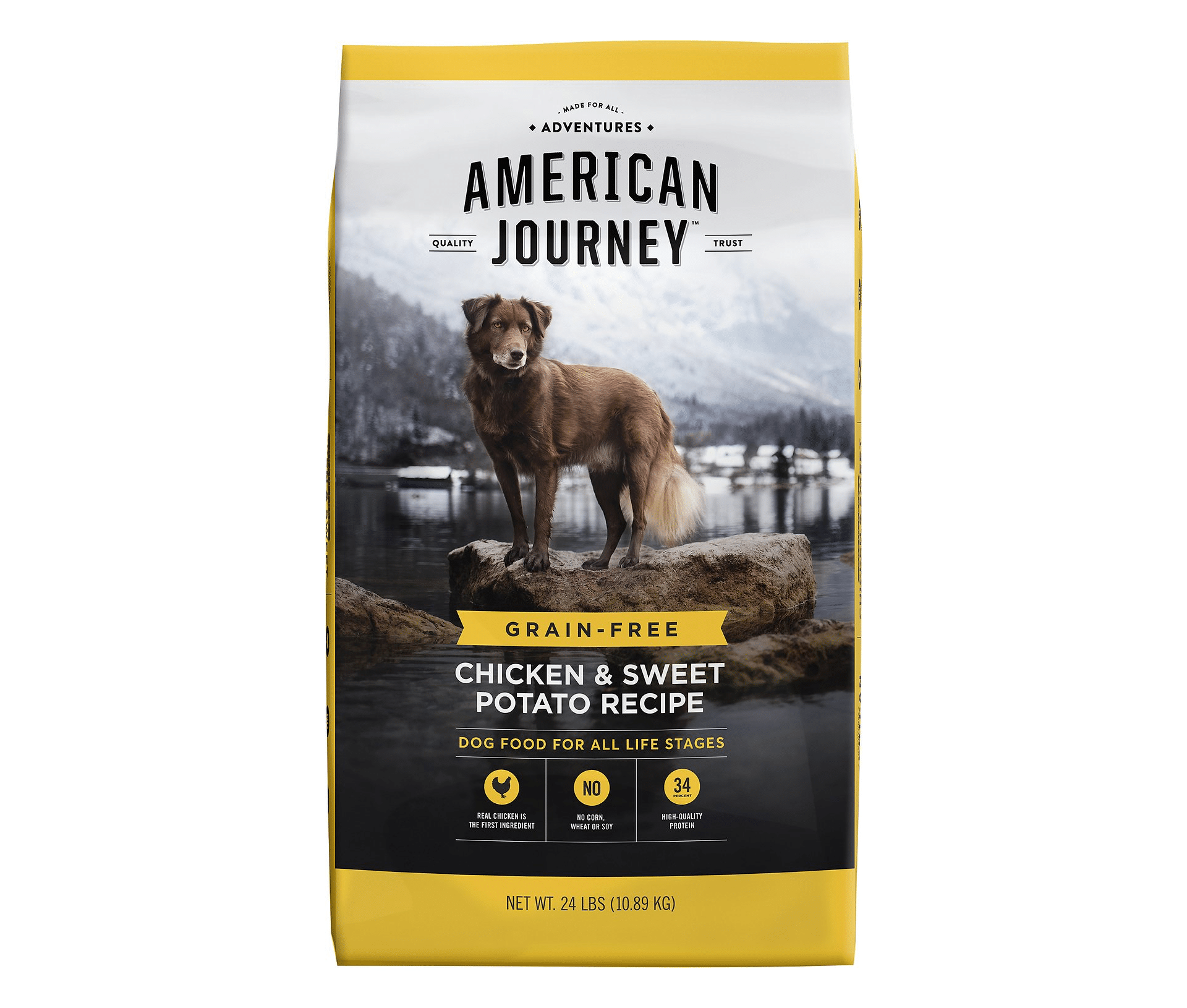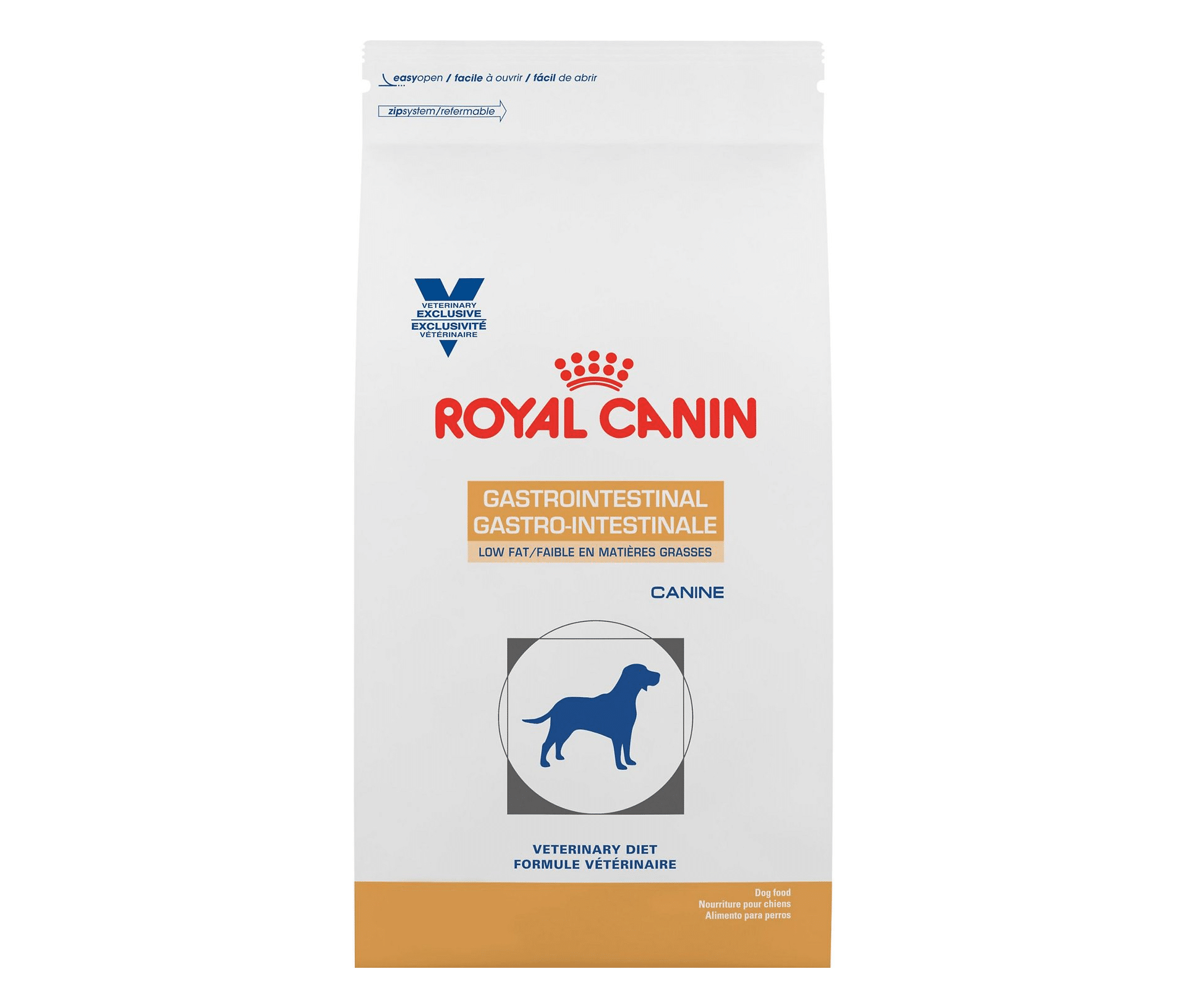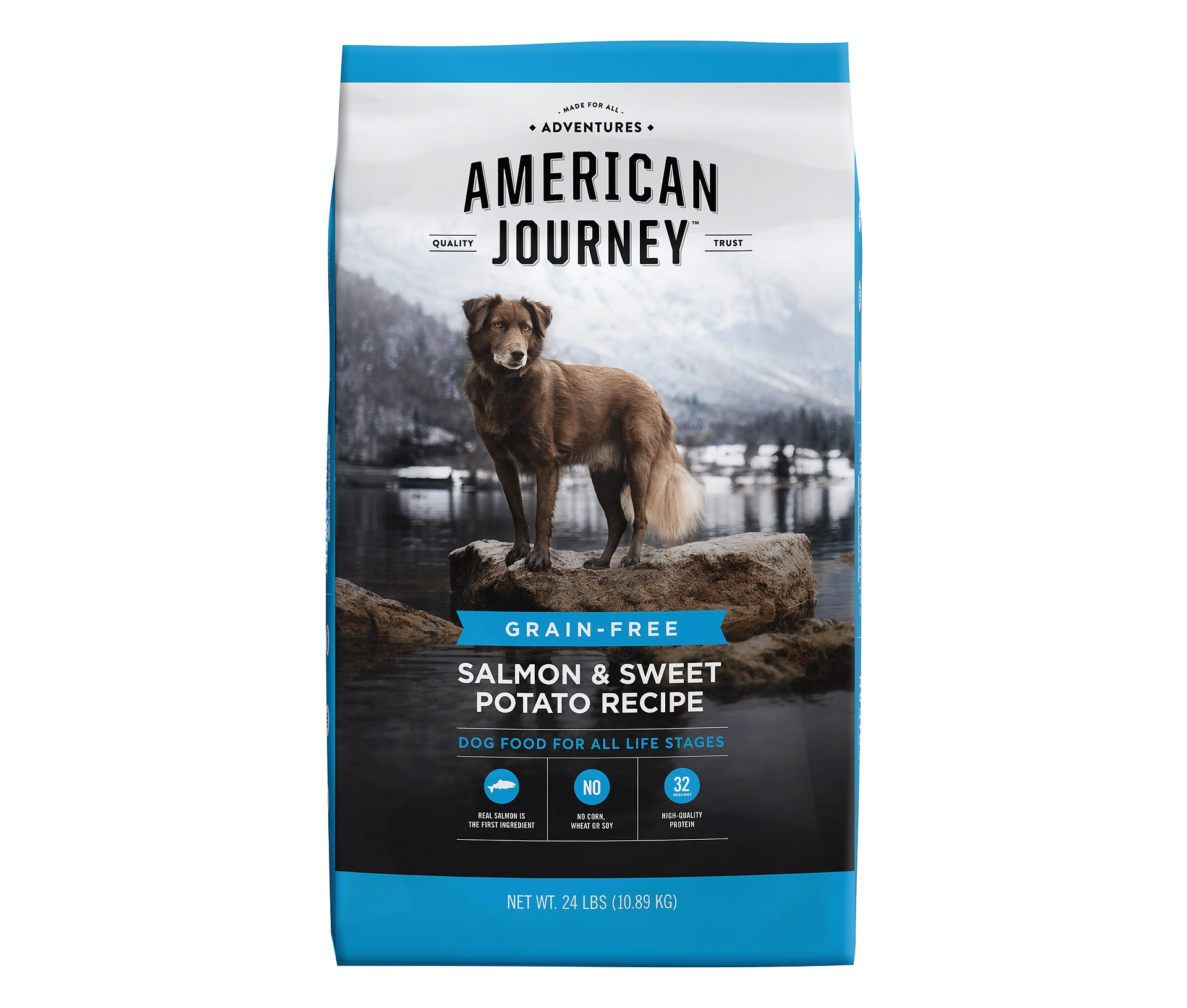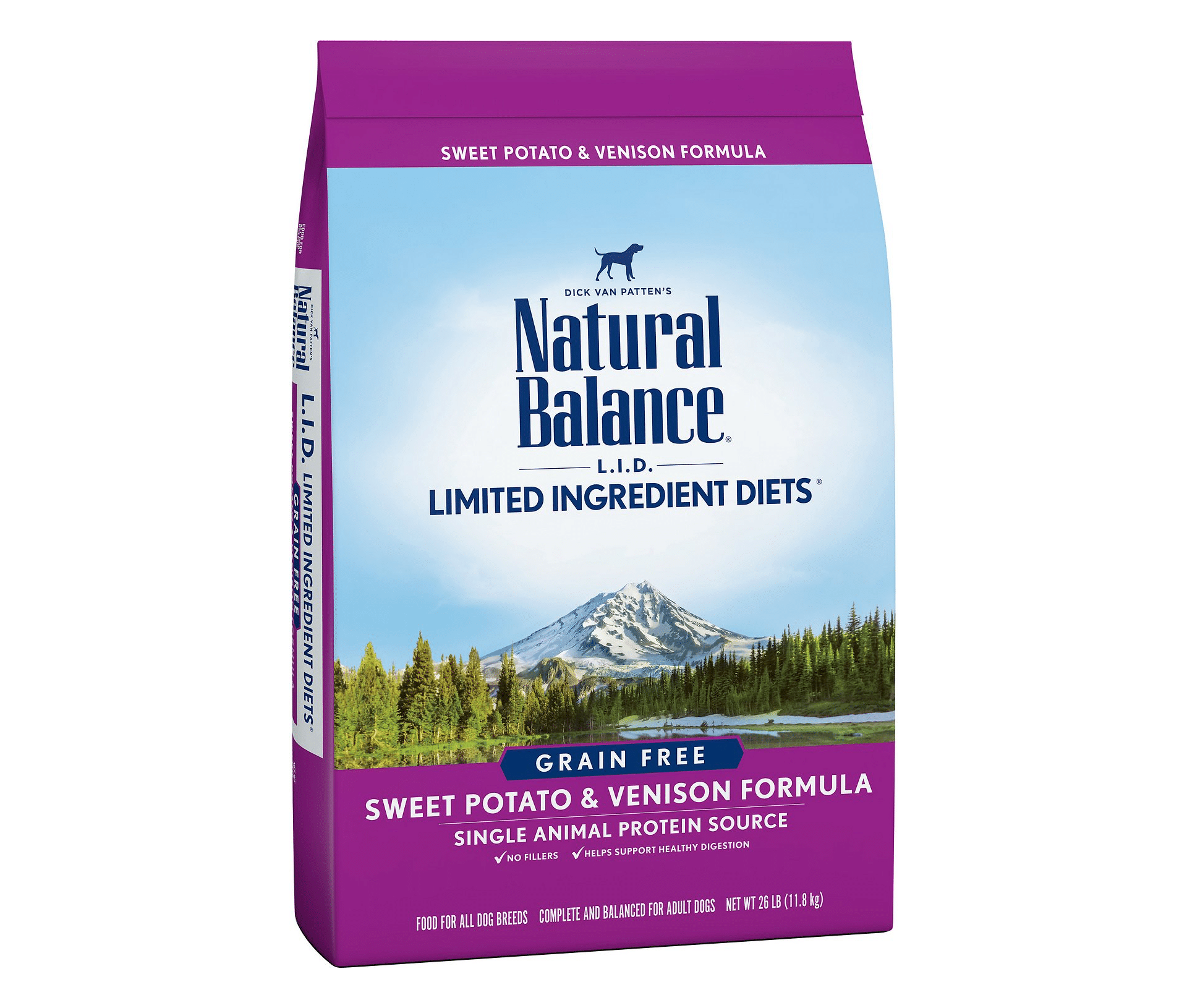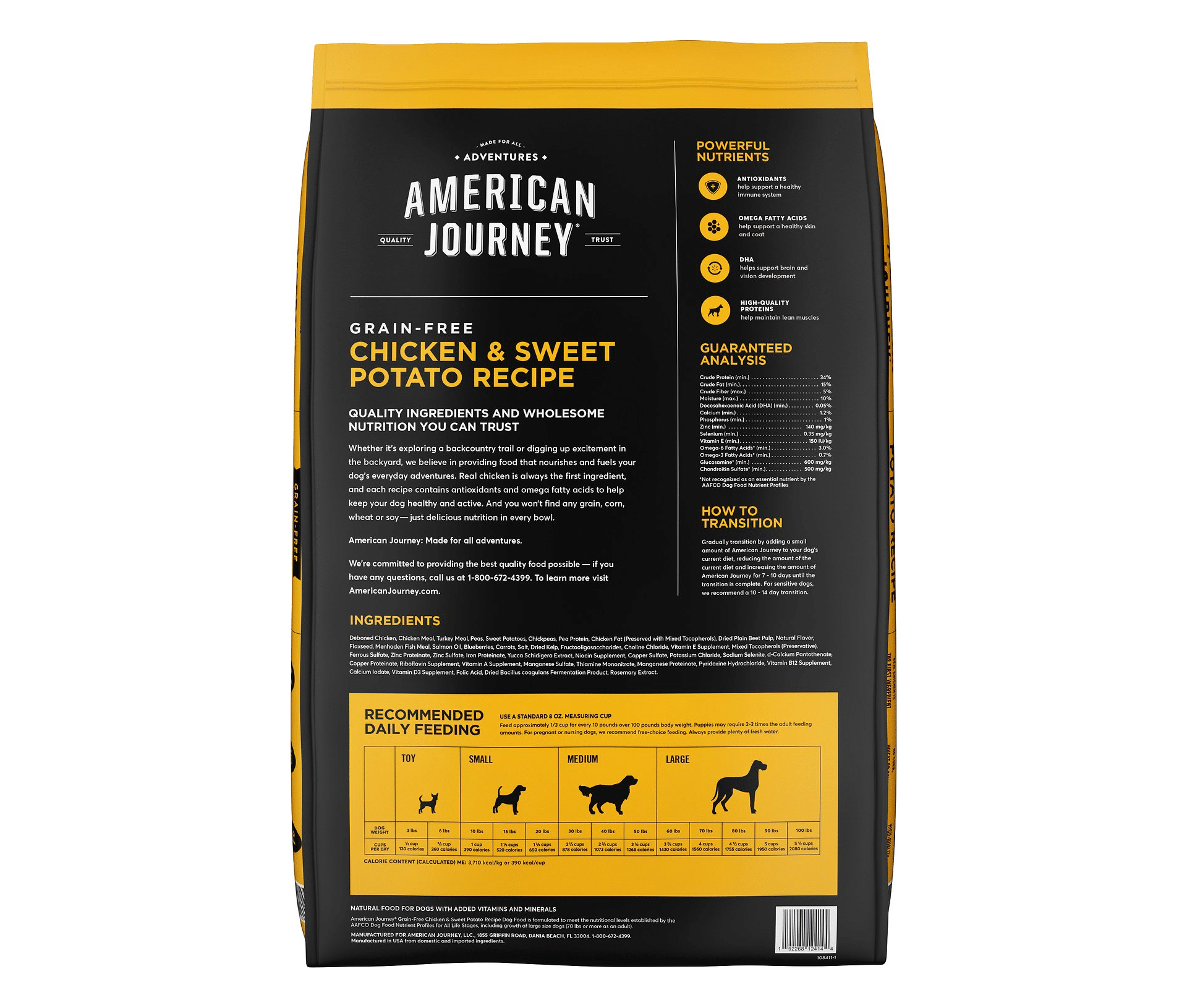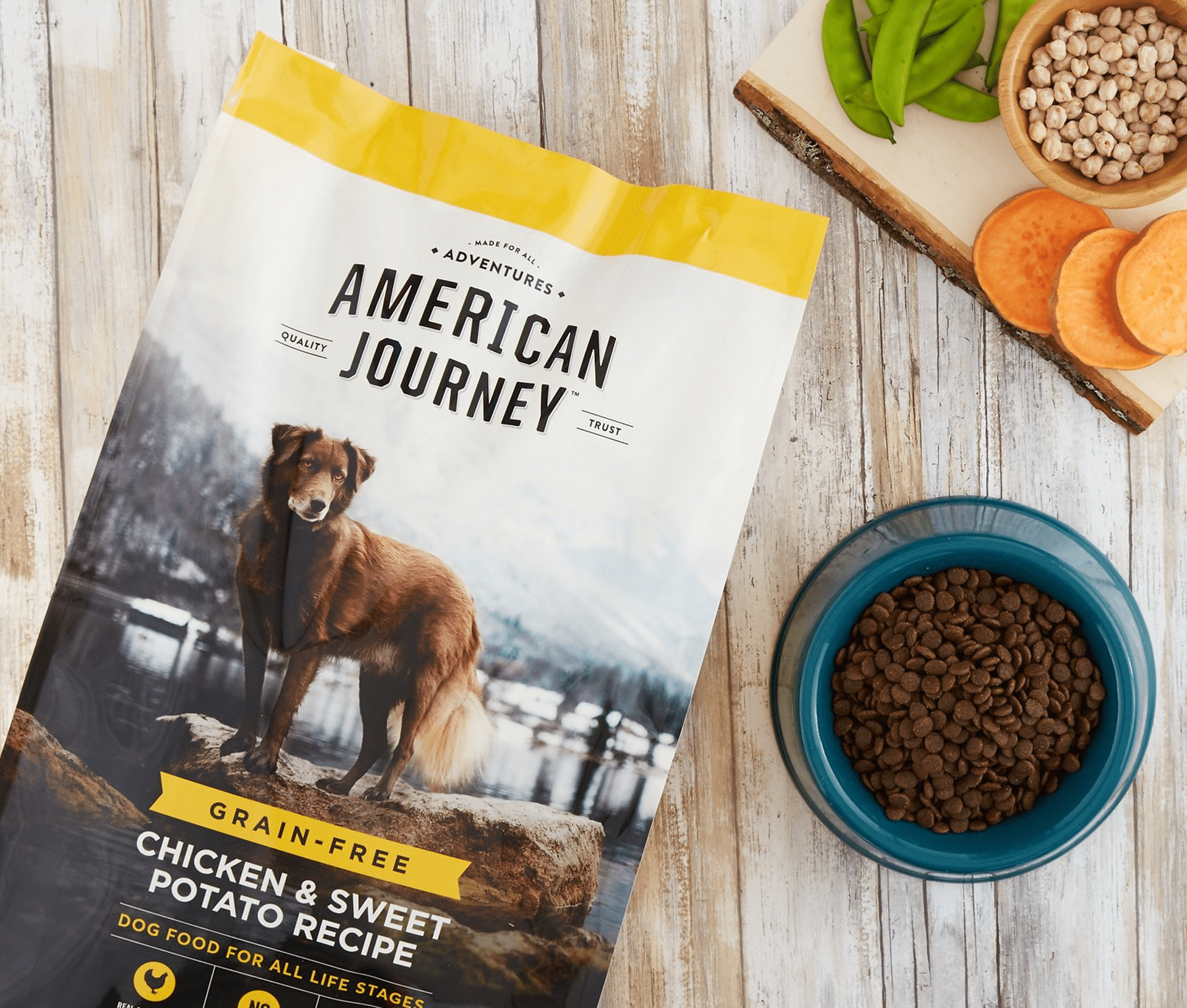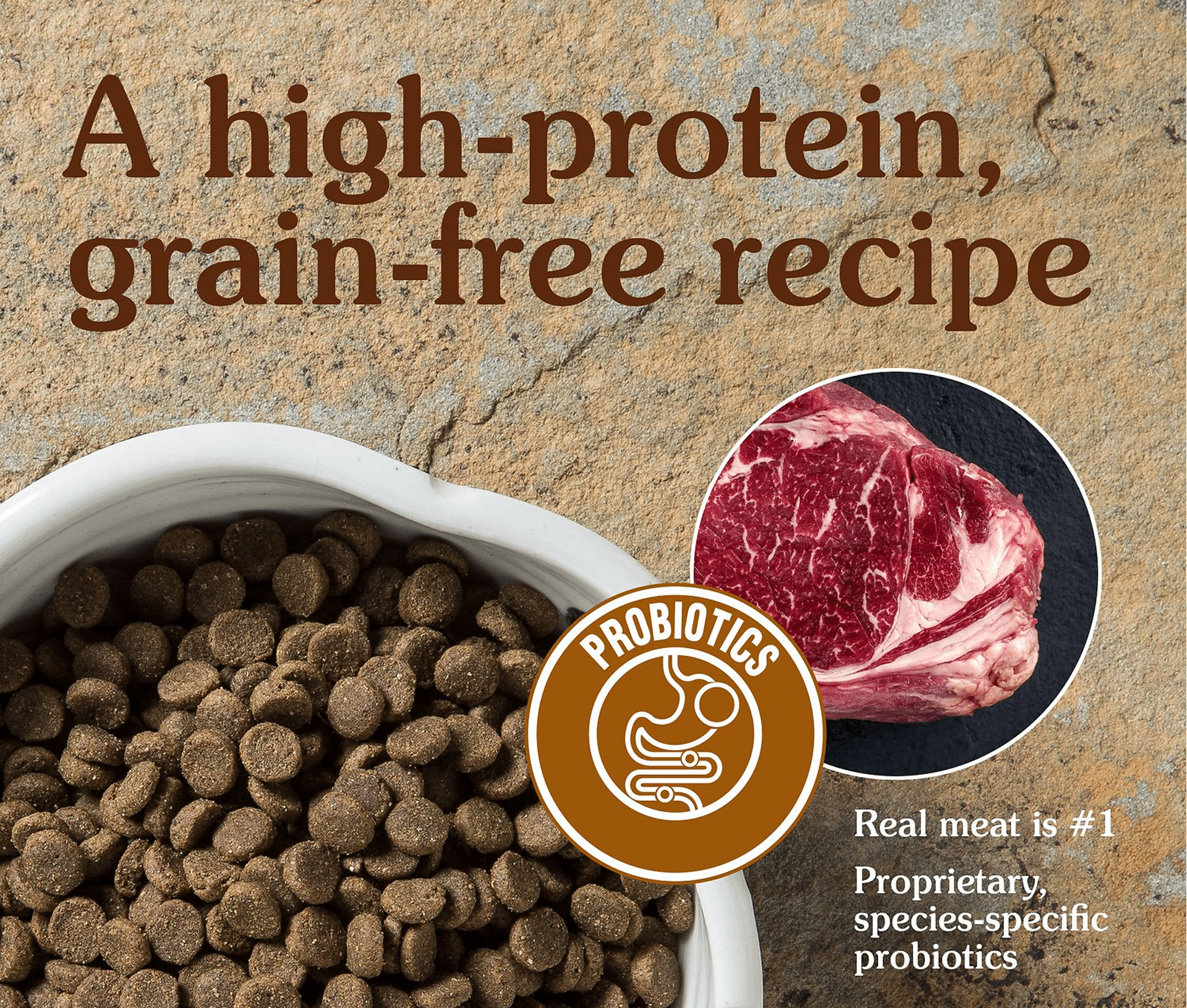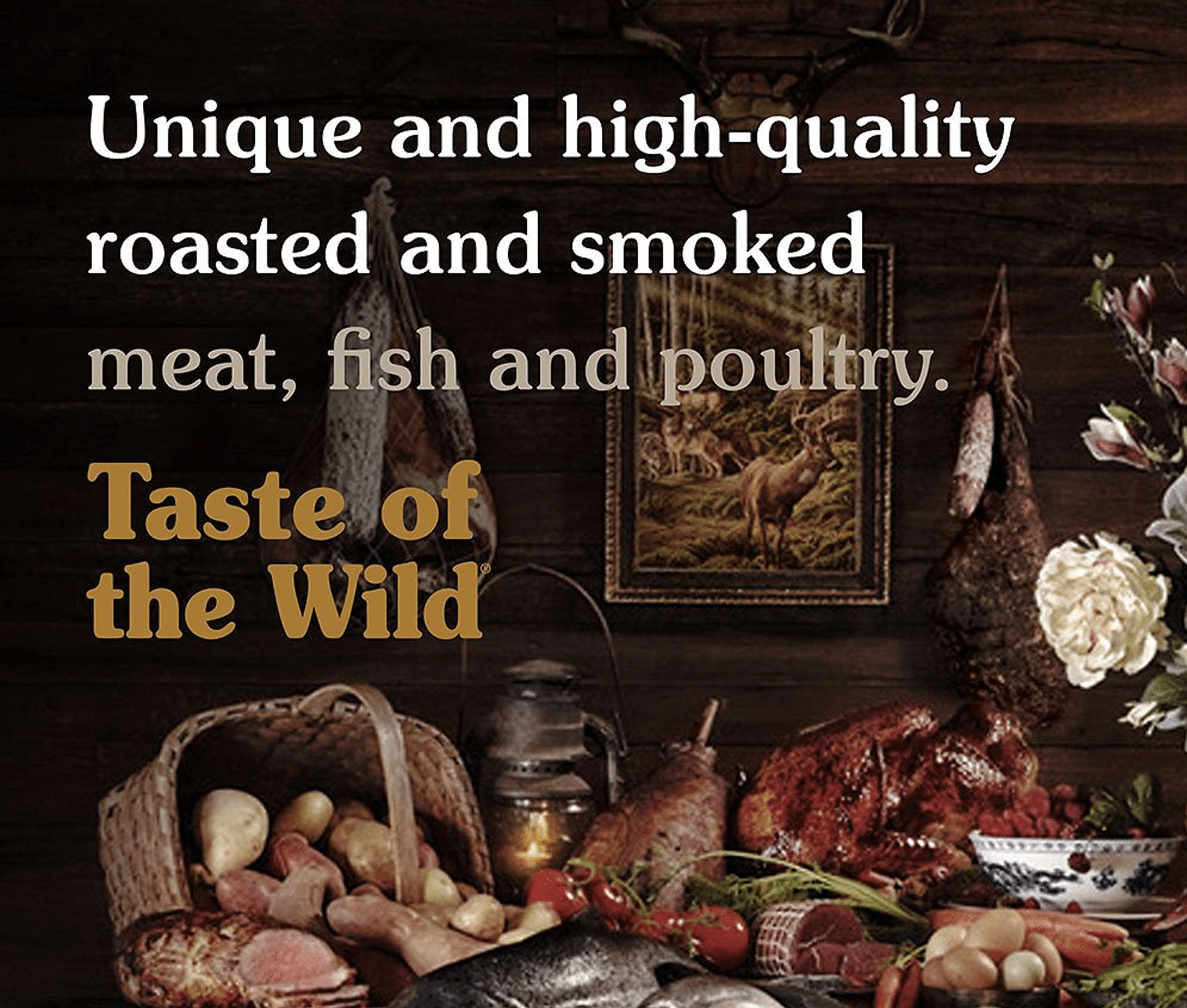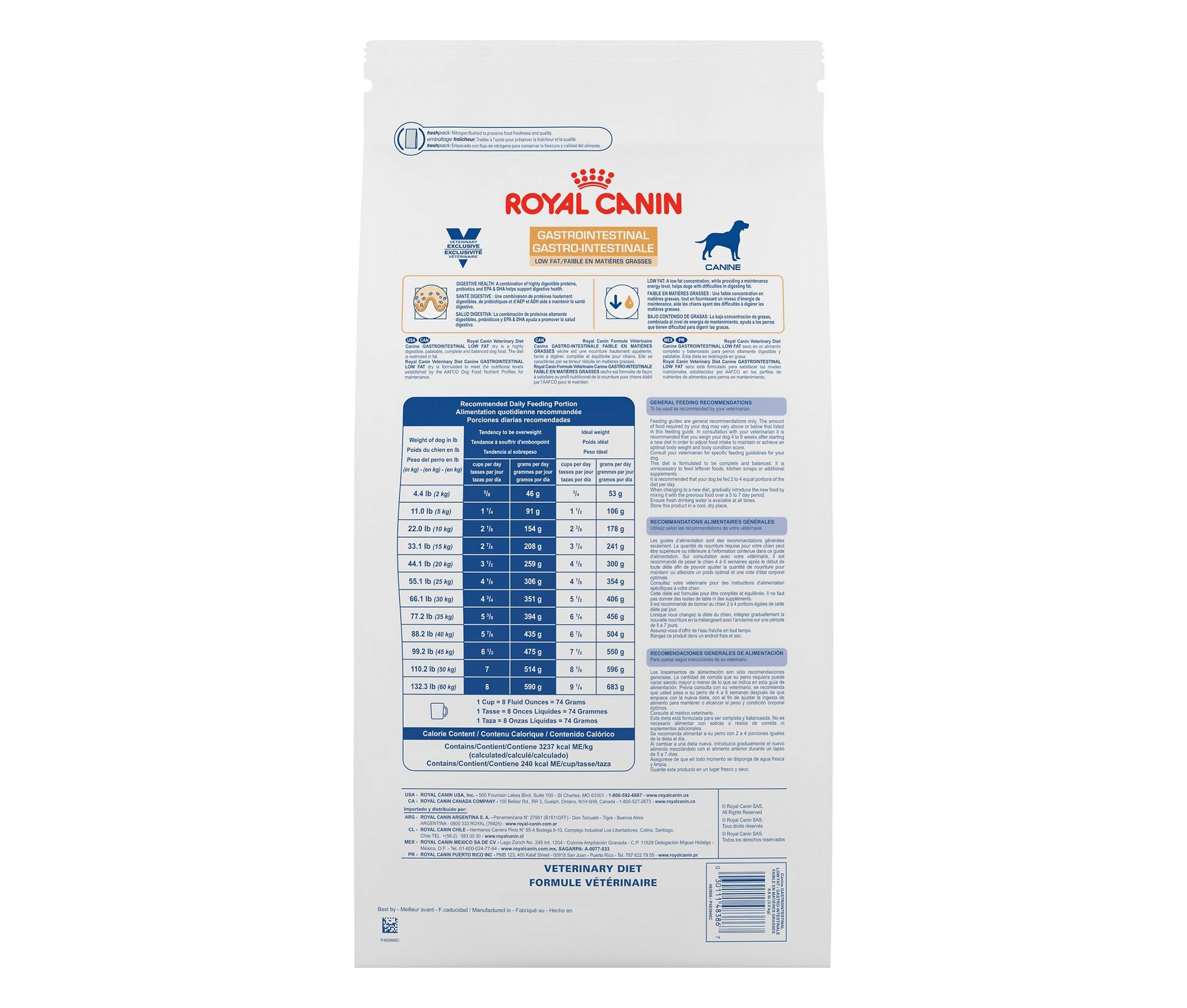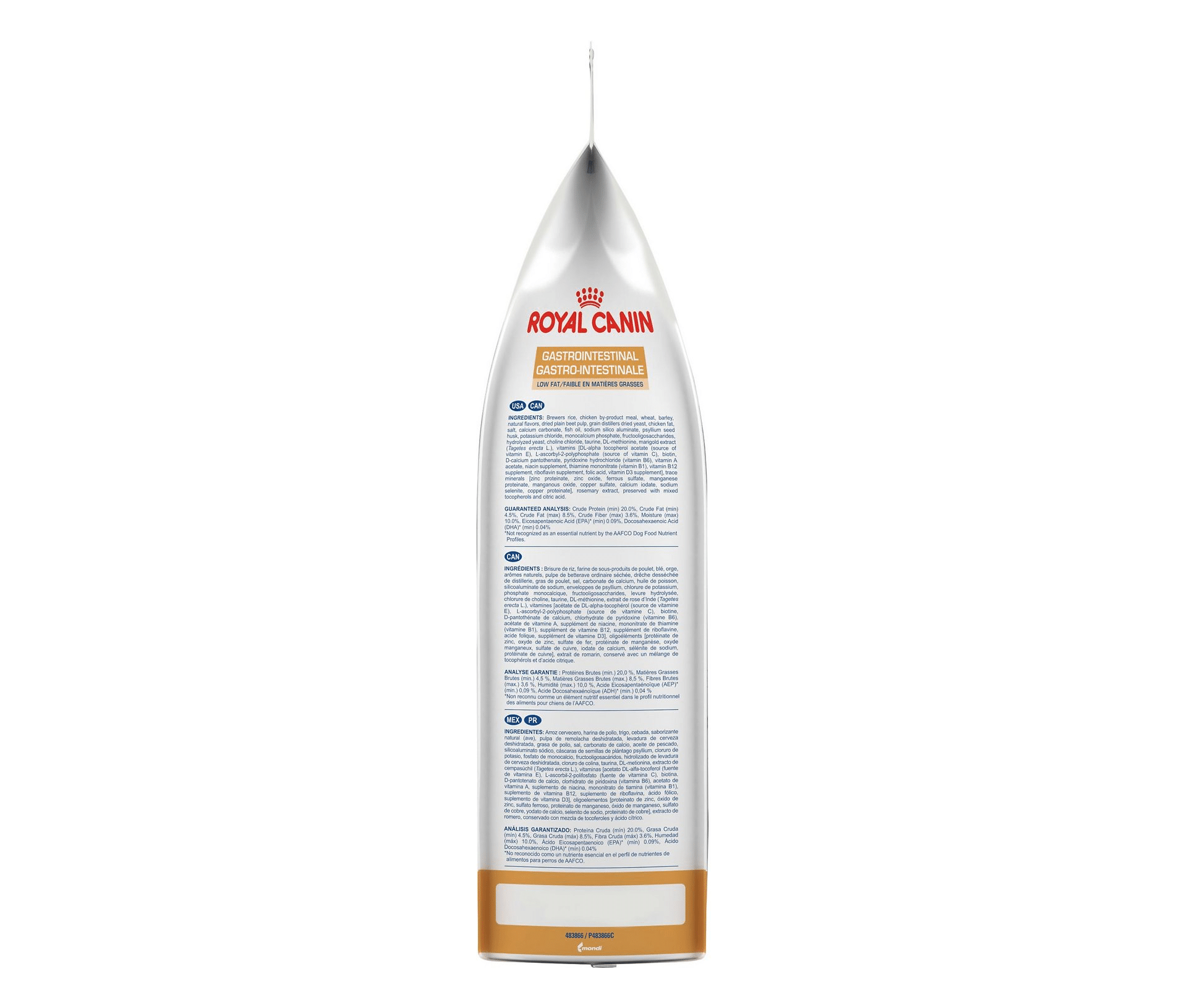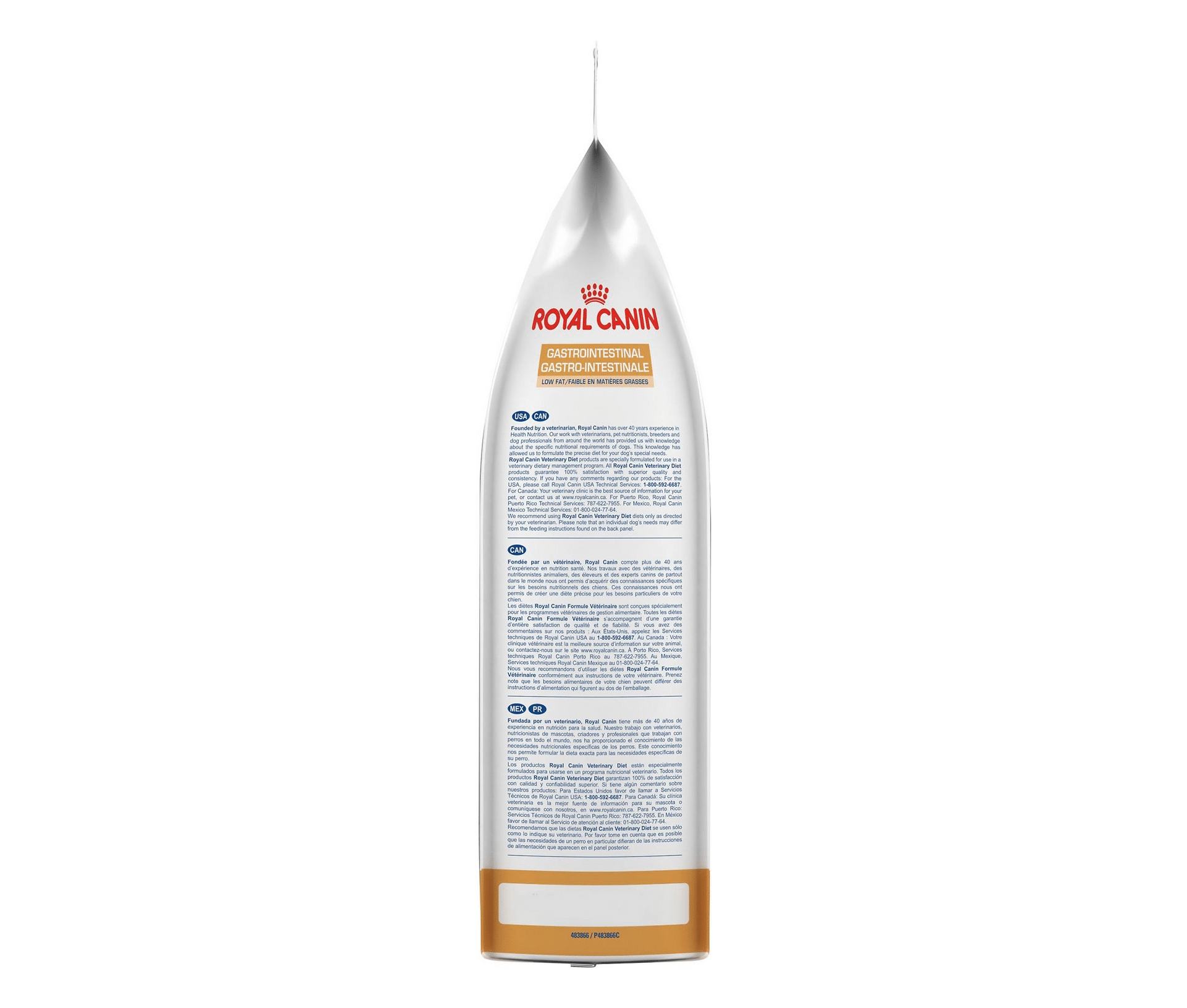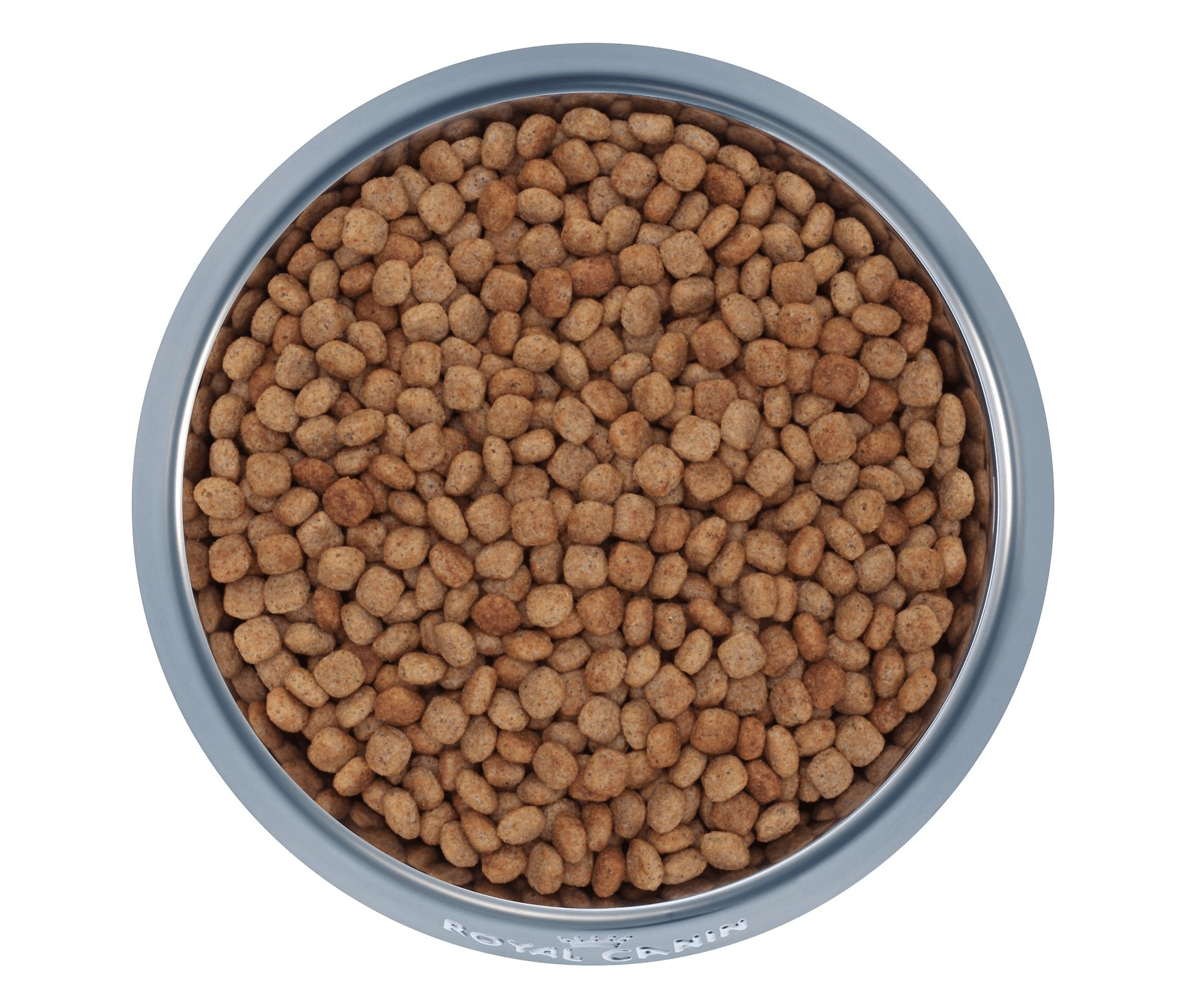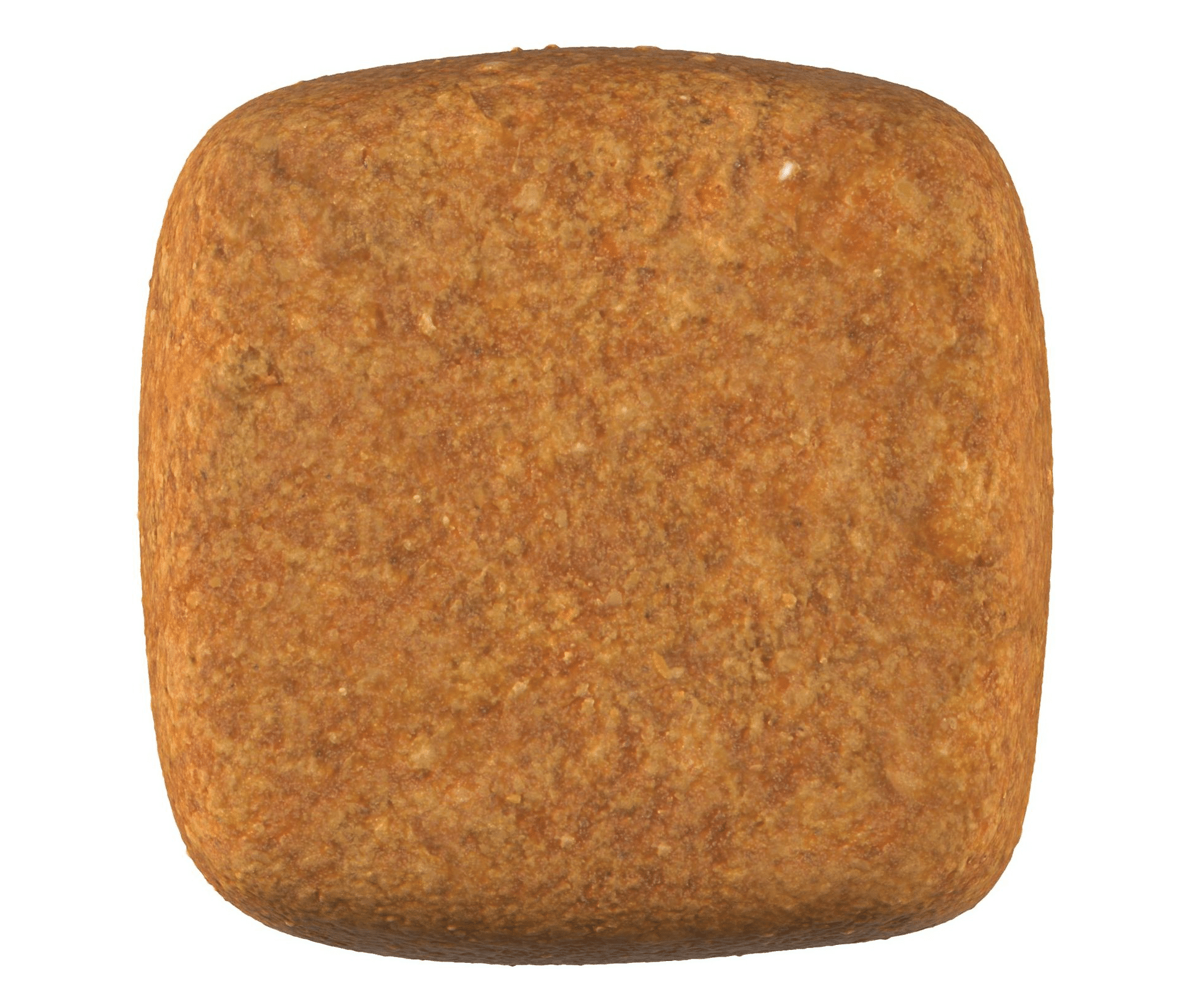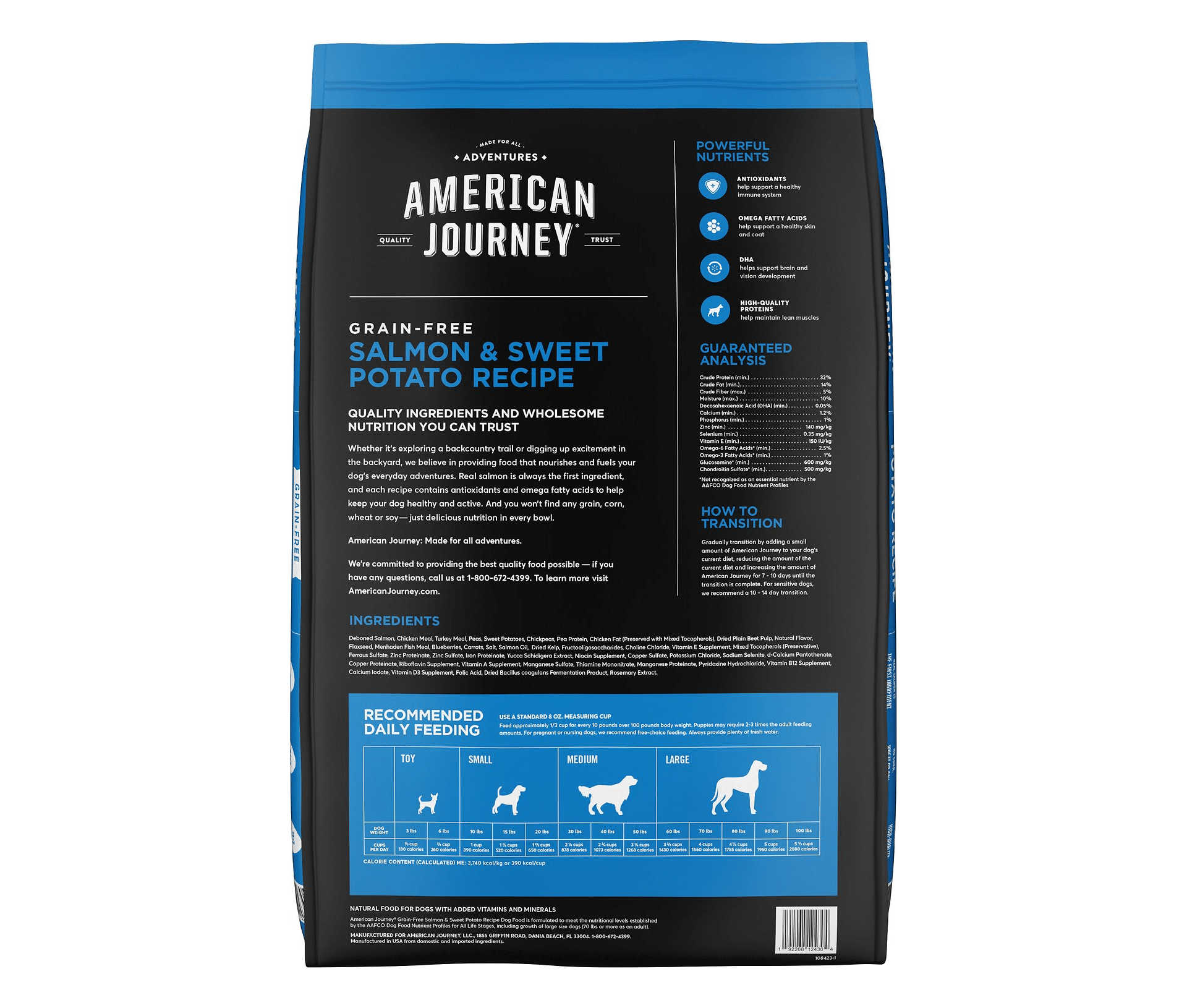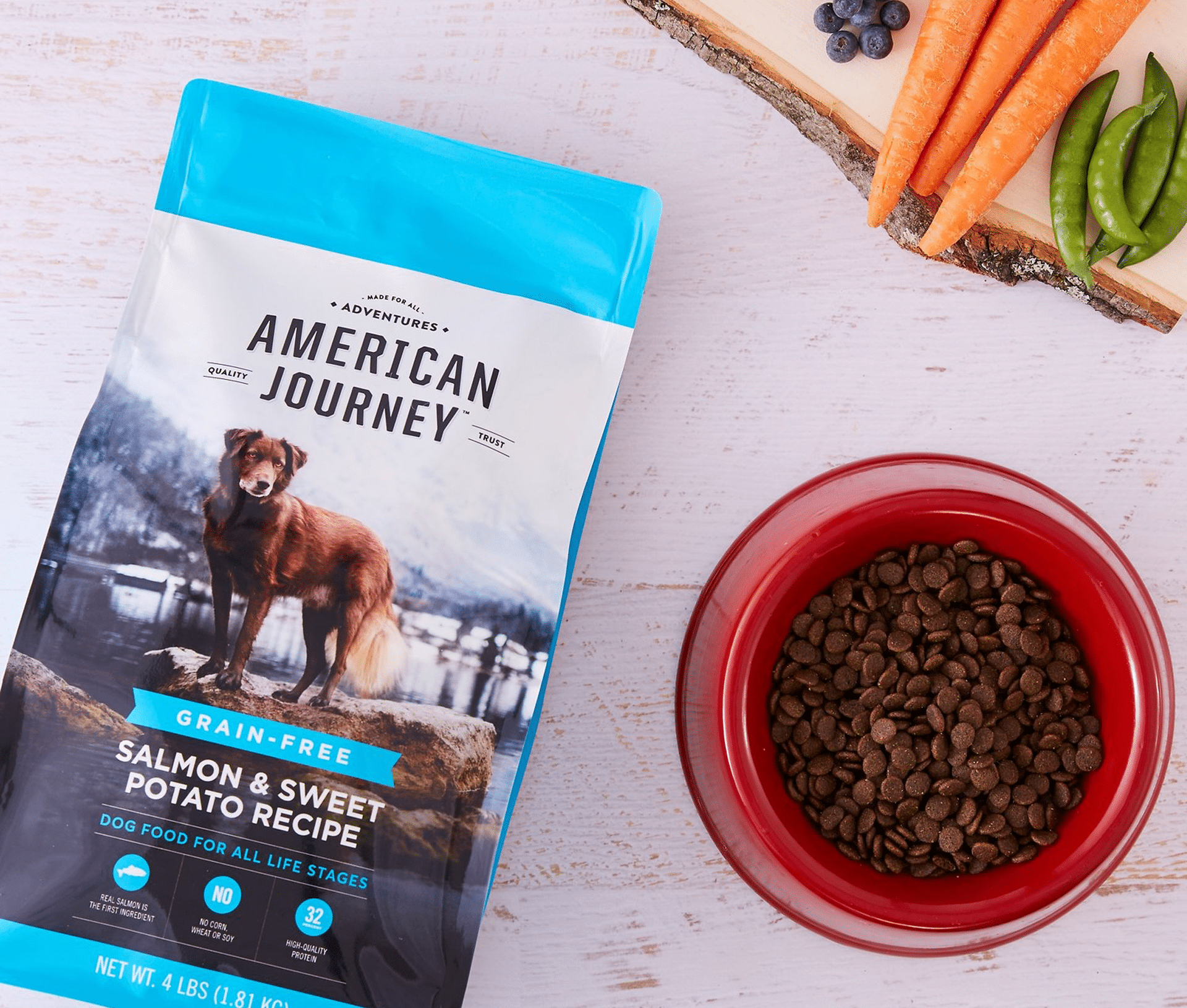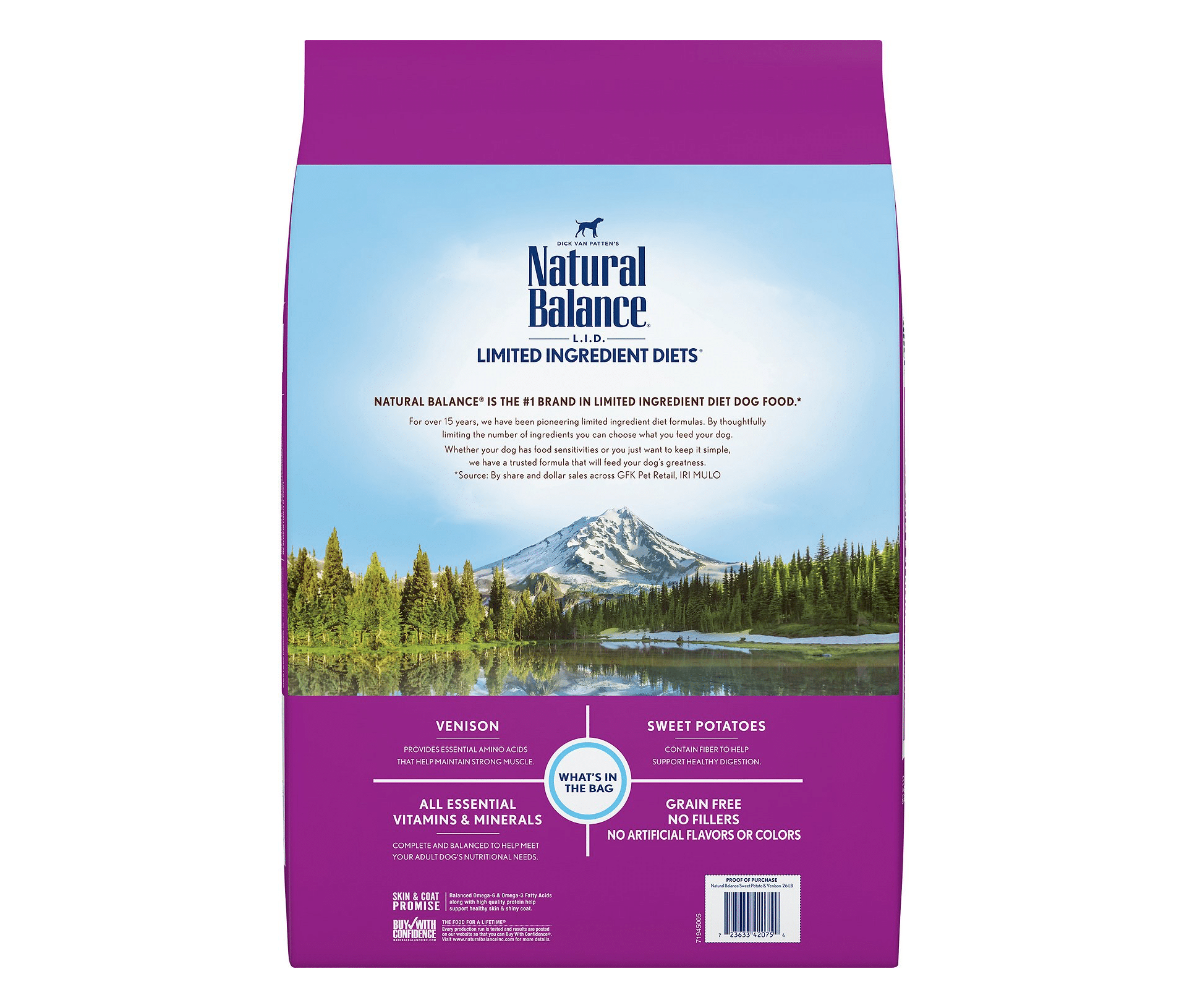There are tons of choices to pick from in the dog food market, so much so it can make choosing the right food for your dog difficult.
With so many options, how do you pick the right one for your best friend? Well, that’s what we intend to address in this article.
So what is the best dog food for large breeds? Well, not all breeds are made alike, and larger breed dogs come with their own set of criteria which should be met.
Larger breeds require larger caloric and nutritional intake. There are other factors which should be taken into account like age, health, metabolism, activity level, and build.
In this article, we will be going over the guidelines to pick the optimum food for your large breed dog and provide you with our recommendations.
American Journey Chicken & Sweet Potato Recipe Grain-Free Dry Dog Food
American Journey contains grain-free nutritious ingredients that offer every-day support to your pet.
Key benefits of that Chicken & Sweet Potato Recipe include nutritious minerals for immune system support, real deboned chicken rich in amino acids for lean muscle mass, and salmon oil to support your dog’s skin, brain and eye development.
Blueberries loaded with vitamin C and E teamed with fiber offer powerful antioxidants for urinary tract health.
Alongside the blueberries, kelp contributes to skin and coat shine, supplying natural minerals.
Pros
- Grain-free and soy free for food-sensitive pets
- Vitamins, minerals, antioxidants, and phytonutrients come from fruits and vegetables like blueberries, carrots and dried kelp
- High-protein that includes real, deboned salmon for muscles
- Salmon and flaxseed oils provide omega-3 and 6 fatty acids, including long-chain DHA, for your dog’s skin and coat health
- Has fiber from chickpeas and sweet potatoes
Cons
- Not suitable if your dog isn't fond of dry food
Taste of the Wild––High Prairie Grain-Free
Taste of the Wild’s high quality grain-free dry dog food contains proteins that include bison.
High Prairie Grain-Free’s recipe includes vegetables such as peas and sweet potatoes that deliver the highly-digestible energy that your dog needs, along with natural antioxidant support from real fruits and vegetables.
Available to all sizes and breeds, this recipe is corn and grain-free, which is great for dogs prone to sensitivities.
Essential minerals are combined with amino acids to optimize their absorption and ensure maximum benefit, for complete and balanced nutrition with a taste of the wild your canine companion craves!
It is recommended to transition your dog over 7-10 days by adding a small amount of new food to your dog’s previous diet, gradually increasing the new and decreasing the old intake until the transition is complete.
Pros
- Buffalo is listed as the first ingredient
- Includes other meats such as roasted venison and beef for lean protein to help build strong muscles
- The food has no grain fillers, artificial flavors, colors or preservatives
- Ingredients come from sustainable sources
- The added vitamins and antioxidants come from real fruits and vegetables
- Omega-3 and omega-6 fatty acids to support a healthy skin and coat
- The recipe includes a proprietary K-9 strain probiotic blend to help support digestive health
- Made in the USA by a family owned and run company
Cons
- Not suitable for fussy eaters
- Higher price point
Royal Canin Veterinary Diet Food
Royal Canin Veterinary Diet Food is a palatable, digestible diet formulated for dogs that may have difficulties digesting fat. It includes antioxidants to support a healthy immune system.
This diet formula provides a combination of highly-digestible proteins and prebiotics to maintain the balance of good bacteria in your dog’s gut.
This, coupled with a blend of dietary fibers that help support healthy digestion for optimal stool quality, make this product a real contender.
Omega-3 fatty acids, EPA, and DHA from fish oil help to nourish and soothe your dog’s gastrointestinal (GI) tract to support your dog’s gastric health.
Pros
- Diet formulated for dogs that may have difficulties digesting fat
- Helps with digestive issues including vomiting, diarrhea, or lack of appetite
- Highly digestible proteins and pre-biotics to maintain the balance of good bacteria in your dog's gut
- Contains a precise blend of antioxidants to support a healthy immune system
- Includes omega-3 fatty acids, EPA, and DHA
Cons
- To order this food, you need Veterinary Authorization.
- Not grain-free
American Journey Salmon & Sweet Potato Recipe Grain-Free Dry Dog Food
Suitable for dogs with sensitivities, this American Journey recipe is chock-full of wholesome fruits and omega-3 from natural sources like salmon oil and flaxseed.
Fruits and vegetables like blueberries, carrots, and dried kelp give your dog fiber, phytonutrients, and antioxidants.
Omega fatty acids, including DHA, an omega-3 supports the healthy development of the brain and eyes, salmon and flaxseed oils keep your dog’s skin and coat healthy.
This recipe is grain-free and has no soy, which makes it an excellent choice for adult dogs of all sizes that are prone to food sensitivities.
Pros
- Grain-free and soy free for food-sensitive pets
- Vitamins, minerals, antioxidants, and phytonutrients come from fruits and vegetables like blueberries, carrots and dried kelp
- High-protein that includes real, deboned salmon for muscles
- Salmon and flaxseed oils provide omega-3 and 6 fatty acids, including long-chain DHA, for your dog’s skin and coat health
- Has fiber from chickpeas and sweet potatoes
Cons
- No small breed formula
Natural Balance L.I.D. Limited Ingredient Diets Sweet Potato & Venison Dry Dog Food
Natural Balance source premium ingredients to provide a protein-rich formula and this Sweet Potato & Venison Dry Dog Food is no exception.
Microbiologists at Natural Balance aim to provide high-quality nutrition for adult dogs; this grain-free dog food contains essential amino acids that promote strong muscle tone.
Rich in potassium, the sweet potatoes are a highly digestible energy source to maintain your dog’s digestive health making this the perfect product if your dog is experiencing difficulty passing stools.
Pros
- A grain-free recipe with limited carbohydrates and no artificial flavors or colors
- Formulated to provide high-quality nutrition for all breeds
- It contains Omega-3 fatty acids from flaxseed to give dogs a healthy, shiny coat
- With a single animal protein source, this formula is perfect for dogs with food sensitivities
- Real food
Cons
- Does include some preservatives
- Only suitable for adult dogs
Best Dog Food for Large Breeds: Basic Dog Nutrition
Dogs require a wide range of nutrients, including vitamins and minerals. This is why giving your dog a complete and balanced commercial diet is probably the most convenient and reliable option for most dog owners.
Most commercial dog foods do meet the nutritional standards of dog food regulations by including meats, vegetables, and even fruits. However, contrary to popular belief, dogs do not have ‘cast iron’ stomachs and need their food to be formulated, so it is easily digestible.
Why Can’t My Large-Breed Dog Eat Regular Dog Food?
Overall, small- and medium- dog nutrition is comparable to large-dog nutrition, with some crucial differences.
Large-breed puppies need specially made diets to avoid health risks specific to large breeds. And large-breed adult dogs require careful monitoring for signs of orthopedic disease, obesity, and bloat.
All of which are heavily affected by the diet they eat.
In addition to the components you would want in any other food for your dog, you will also need to look for a few key ingredients when choosing a large-breed dog food. This is especially important when your dog is still a puppy and growing rapidly.
Ed Kane, Ph.D., discusses some of the factors that can lead to problems for giant breed dogs in his article “Developmental orthopedic disease in large-breed puppies,” February 4, 2013.
In the article, he describes how rapid growth in puppies can quickly lead to skeletal abnormalities. http://veterinarynews.dvm360.com/developmental-orthopedic-disease-large-breed-puppies.
Puppies!!
Puppies will need food that will meet the high caloric demands of their growing bodies. And you will need one that is made explicitly for large-breed puppies.
Most people think of puppies becoming adult dogs once they reach the one year mark.
However, it is important to note, that large-breed puppies such as Labrador retrievers or German shepherds grow quickly. And will continue growing for a longer period of time than smaller dogs.
Typically they don’t reach adulthood until they are between the ages of one year and 18 months. Moreover, giant breeds such as mastiffs and Great Danes, which may weigh over 100 pounds often take up to 24 months before they are considered adults.
Because large-breed puppies grow so fast and for a longer timeframe, this means that they are more sensitive to nutrient and caloric intake. Additionally, any imbalances, deficiencies, and excesses can all negatively impact your large-breed puppy’s health.
If you choose a brand not explicitly made for large-breed puppies, you could risk permanent bone damage.
It is not healthy for large-breed puppies to grow too quickly. This accelerated growth has been linked to developmental orthopedic disease (DOD), which covers a range of conditions, including:
- Hypertrophic osteodystrophy
- Osteochondrosis
- Retained ulnar cartilage core
- Panosteitis
- Hip or elbow dysplasia
Overfeeding can play a role in excessive growth, which is why it is essential to feed your large-breed puppy a suitable diet.
Please note that large-breed puppies food differs from a regular puppies diet in four ways. It is lower in calcium, vitamin D, fat, and phosphorus.
It may be enticing to assume that large-breed puppies need more calcium to support their bone growth, but it is important to note that the opposite may be true.
Some studies have linked higher levels of calcium and phosphorus to DOD.
Therefore, limiting the intake of calcium, phosphorus, and vitamin D helps reduce the risk of DOD in puppies, and restricting the amount of fat and calories in their food will also help to slow growth rates, so they don’t grow too fast.
How much you feed your puppy also matters. Veterinarians strongly discourage freely feeding large-breed puppies, as this too has been linked to DOD.
Instead, feed your puppy several smaller meals throughout the day and be sure to monitor his weight to assure it stays within a healthy range. Ask your veterinarian for help to find the appropriate weight range for your dog’s breed.
Large-Breed Adults
Once your large-breed puppy has made it to adulthood, it is time to find appropriate adult food.
As with puppies, it is also important to feed large-breed adults with a diet designed specifically for them.
During this transitional period, take the time to talk to your veterinarian about his or her recommendations to feed your adult large-breed dog.
Your vet will be happy to discuss any insights regarding the best diet for your dog, based on breed, size, and any other health concerns.
Additionally, veterinarians have access to a wide range of resources to help you make an informed choice.
Your large-breed adult dog’s diet will have a strong influence whether he or she develops any of the following three conditions:
- Orthopedic disease
- Obesity
- Bloat
Orthopedic Disease in Dogs
Orthopedic disease in large and giant breed dogs includes hip dysplasia, arthritis, and osteochondrosis. These diseases have been linked to hereditary factors, excessive growth, amount of exercise, and nutrition.
As a large breed dog owner, you cannot control your dog’s hereditary factors, apart from selecting a puppy from a responsible breeder who only breeds healthy dogs. However, it is up to you to monitor his diet, exercise, and to make sure he maintains a healthy weight.
Obesity in Dogs
Approximately 53 percent of American dogs are obese or overweight. Obesity in large-breed dogs is particularly dangerous, as it increases their risk for orthopedic diseases later in life.
Just like with humans, extra weight can stress your dog’s joints, muscles, and bones, which can lead to serious conditions that affect their mobility and quality of life.
Again, as with humans, obesity has also been linked to other serious health conditions for dogs, including Type 2 diabetes, kidney disease, and high blood pressure.
For adult large-breed dogs, their diet should contain a moderate amount of calories. Any food that will help a dog ‘bulk up’ tends to be super high in calories and can lead to obesity.
In particular, this can be a significant problem for many large breeds, including among others, Great Danes, Mastiffs, and Rottweilers.
Bloat in Dogs
Gastric dilation and volvulus (GDV), commonly known as bloat, is a severe and sometimes life-threatening condition that affects large and giant breed dogs. Bloat occurs when gasses rapidly accumulate in the stomach and have no way to escape.
Sadly, this condition can be fatal within just a few hours. Even though there are several treatment options, as with many things, prevention is still the best medicine.
To reduce your dog’s risk of bloat, be sure to do the following:
- Instead of feeding one large, heavy meal, feed your dog several smaller meals a day to prevent him from wolfing down his food.
- Feed your dog at floor level in place of using a raised feeder.
- Avoid feeding your dog foods that have high-fat content. Look for oils and fats among the first four ingredients on the label.
- Be sure that the kibble is a large enough size to encourage chewing thoroughly. This will slow down their eating.
Avoid strenuous exercise 1-2 hours after eating. - Look for a reputable dog-food manufacturer that carries a large-breed formula and as always, be sure to ask your veterinarian for his dietary recommendations.
Senior Citizens
Diets specifically designed for senior dogs is a relatively new concept.
According to the U.S. Food and Drug Administration (USFDA) and the Association of American Feed Control Officials (AAFCO) currently, there is no ‘senior’ stage of life for dogs.
This means that the ‘senior’ dog foods currently being advertised have not undergone the same rigorous tests as food marketed for other life stages such as for puppies.
However, this does not mean that they are not a good option for your senior dog. All adult and senior formulas can be appropriate for your senior citizen.
Notwithstanding, senior dogs frequently develop other health problems requiring veterinary care and maintenance. Sometimes the best dog food option for large-breed seniors is a prescription diet.
These veterinarian-approved regimens are uniquely formulated to take care of your dog’s specific needs. Be sure to talk to your vet about the best food for large-breed seniors.
Feeding your dog a high-quality diet with the proper balance of nutrients for large-breed dogs will help prevent joints, muscles, and bones from breaking down.
Many large-breed adult formulas also include the joint supplements glucosamine and chondroitin to further improve orthopedic health and reduce the discomfort and damage associated with such conditions.
The Truth in Labeling
Dog food labels can be a valuable source of information regarding your dog’s food. As with many other types of labels, they can also be misleading.
As you search for the best food for your large breed, you will likely encounter an enormous selection of products. As you do your research, keep the following in mind:
- Ignore unregulated phrases such as ‘all natural’ and ‘human-grade ingredients’
- Look for foods that are labeled ‘complete and balanced.’
- Be sure to choose a dog food that has been clinically tried and tested
Dog food labels will not tell you about the quality of the ingredients. In fact, technically, references to quality are not allowed.
The ingredient list will tell you where the proteins and carbohydrates come from. This is vital information if your dog has any food allergies or sensitivities.
How Much to Feed a Large-Breed Dog
There is no definitive answer to how much you should feed your large-breed dog. Every dog has his or her own unique caloric demands.
The nutrition label on your dog’s food does provide guidelines for owners, but be sure to check with your veterinarian so the amounts can be tailored for your dog.
Veterinarians judge the weight of your dog based on something called the ‘body condition score’ (BCS), which is similar to a human’s Body Mass Index (BMI) score. This helps them determine if your pup is overweight or underweight and if you need to adjust their food intake.
The Large Price of Large-Breed Dog Food
Large-breed dogs consume large amounts of food. Obviously, this means a higher cost for feeding your large-breed dog than for feeding a smaller breed.
This is an important consideration for anyone thinking about purchasing a large-breed puppy.
To save money, it may be tempting to buy cheaper food for your large-breed dog. Quality is the most important factor when it comes to feeding your pup.
There are many good quality dog foods in various price ranges, but be sure to read the labels to assure yourself of the quality of your dog’s food.
Investing in quality food for your large breed dog equals investing in your pet’s health, which may save you money at the veterinarian in the long run.
Recap
In conclusion, I believe that Taste of the Wild and the Natural balance had the best overall ingredients and the most truth in advertising.
Taste of the Wild used no grain fillers, artificial flavors, colors, or preservatives. They even used quality meats that are not allergens for dogs such as buffalo, roasted venison, and beef.
All the ingredients come from sustainable sources and are great for K-9 health all across the board. Not to mention the food is made in the USA by a family owned and run company.
Which means it’s going to be as fresh as it can get.
Share the Love
If you found this post useful, please let others know about it by sharing it.

